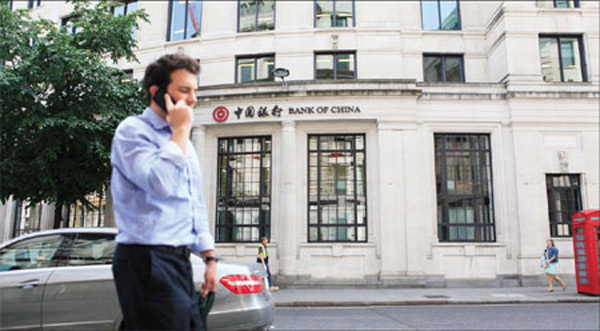

|
 The Bank of China (UK) Ltd in the City of London, which is aiming to be the first offshore renminbi center in Europe. [Photo / China Daily]
|
Inherent advantages help London pip Euro rivals for offshore yuan
Apart from its stature as a leading financial center, London is also known to have the largest offshore yuan market in Europe with total deposits exceeding 100 billion yuan ($16.3 billion).
The offshore yuan market is often seen as the test-bed for China's currency internationalization moves. In June, the United Kingdom became the first G7 country to sign a yuan currency swap deal with China.
Swap lines typically allow banks to access foreign currency in times of crisis. Under the deal, valued at 200 billion yuan, the central banks of the UK and China can undertake currency exchanges and lending activities in cases of emergency.
"Britain has shown its confidence in the growing internationalization of the renminbi and wants to be the first offshore renminbi center in the Western world," says Fang Wenjian, CEO of Bank of China (UK) Ltd.
"Public sector involvement will help speed up the development of the London offshore renminbi market and instill greater market confidence."
London has the right credentials to be the offshore yuan hub, he says, as it has inherent advantages such as developed foreign exchange, derivatives and capital markets, a sound legal and regulatory environment and a unique time zone advantage.
But the most important factor is that the UK government itself is keen to make London an offshore yuan center and has expressed its strong willingness and intention to make it a reality.
London's efforts to boost its yuan business started in September 2011 when the then Chinese vice-premier Wang Qishan, in his meetings with George Osborne, the British Chancellor of the Exchequer, welcomed private sector initiatives for the development of an offshore yuan market in London.
Since then, London's financial players have actively worked on developing new yuan products, so that more yuan transactions for both trade and investment purposes are undertaken in London.
London's private sector initiative to develop yuan products has been led by the City of London Corp, the local authority in charge of London's square-mile business district.
"(We are) working hard to increase awareness of and confidence in the use of yuan products and services in London," says Mark Boleat, policy chairman of City of London.
In April 2012, the City of London launched an initiative for making London the hub for offshore yuan business. The plan aims to provide leadership to the wider financial markets on the technical, infrastructure and regulatory issues relevant for the development of the yuan product market in London.
It also advises the Treasury on maximizing London's capacity to trade, clear and settle the yuan and articulate practical steps and long-term aims for the development of the yuan market in London.
Additionally, the group advises the Treasury and other UK authorities on any financial stability concerns the members may perceive.
 Models at Ford pavilion at Chengdu Motor Show
Models at Ford pavilion at Chengdu Motor Show
 Brilliant future expected for Chinese cinema: interview
Brilliant future expected for Chinese cinema: interview
 Chang'an launches Eado XT at Chengdu Motor Show
Chang'an launches Eado XT at Chengdu Motor Show
 Hainan Airlines makes maiden flight to Chicago
Hainan Airlines makes maiden flight to Chicago
 Highlights of 2013 Chengdu Motor Show
Highlights of 2013 Chengdu Motor Show
 New Mercedes E-Class China debut at Chengdu Motor Show
New Mercedes E-Class China debut at Chengdu Motor Show
 'Jurassic Park 3D' remains atop Chinese box office
'Jurassic Park 3D' remains atop Chinese box office
 Beauty reveals secrets of fashion consultant
Beauty reveals secrets of fashion consultant